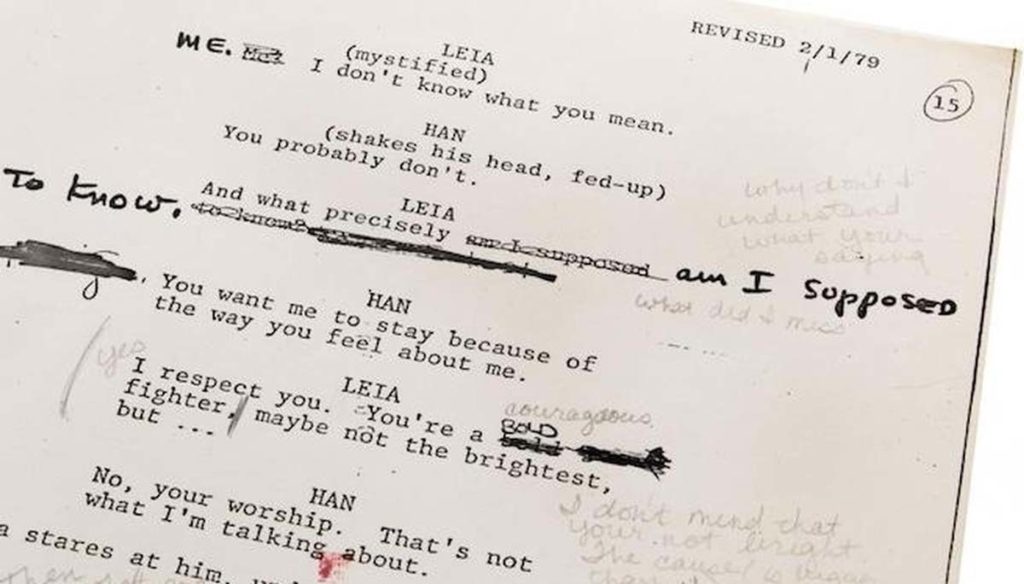If you’ve been waiting for your career to launch, it might be time to make your own screenwriting opportunities.
Whether they know it or not, screenwriters have been trained to accept a particular chain of events that leads to success in Hollywood.
- You write a script.
- You submit it to major contests, competitions, and fellowships.
- You also market it.
- You get a manager.
- You get an agent.
- You go to Hollywood meetings to pitch.
- And then you option or sell your script — and now you’ve made it.
That is the step-by-step process that all screenwriters have in their heads when they first start out.
The frustrating thing is that most of the time, it doesn’t work out that way. One of five things happens.
- The scripts are poorly written, ill-conceived, or just aren’t ready. Thus, they never make it past the submission process.
- You maybe luck out and win a contest, competition, or fellowship, but it doesn’t lead anywhere.
- You get someone to represent you, which leads to meetings, but your body of work isn’t extensive enough to get you writing assignments — and your momentum fizzles.
- You option a screenplay, get excited by that attention, only to realize that options never go anywhere 99% of the time.
- Now you have to rinse and repeat this unending process with each script.
This step-by-step process is preached in screenwriting articles, books, courses, and interviews, making it the go-to avenue all screenwriters take. And it forces screenwriters to sit and wait, hoping that someone will come to them to make their screenwriting dreams come true. That’s not how it works.
Make no mistake, that is an avenue you need to take to spread your net out as wide as possible. However, the screenwriters that actually become professional screenwriters go above and beyond that seemingly endless cycle. They go the distance and make their own screenwriting opportunities happen.
With that thought in mind, here we present five ways that you can clear away your own screenwriting path.
Do Your Research
If you want to find screenwriting opportunities, you need to find those willing to offer such opportunities. And that requires a lot of research.
IMDbPro offers you access to contact information for most Hollywood figures and companies. You need to utilize this tool to create a list of contacts to approach. You can’t just rely on contest, competition, and fellowships submissions, forcing you to wait for results. You’re taking the easy approach by expecting people to come to you.
Test the waters with them, yes. But don’t wait by “the phone” expecting Hollywood decision-makers to come to you. Submit and then forget you submitted as you do the actual work of finding access to companies and industry insiders to cold query. And, yes, cold-querying can be very effective.
Find companies and industry insiders that make the type of movies that you showcase a talent for writing. When you have a tool like IMDbPro, you’re on the road to creating your own opportunities by going out and doing the necessary research.
The More Spec Scripts You Have, the More Opportunities You’re Making
One hot script isn’t enough. The heat usually fizzles because it’s difficult to package and sell a film. Most of Hollywood will be searching for screenwriters that have an excellent body of work.
If you’re submitting to contests, competitions, fellowships, management companies, and production companies with only one or two amazing samples, you’re not doing yourself any favors. In those Zoom calls and meetings, the first question they ask is, “What other projects have you written?”
They don’t want one-hit wonders.
They don’t want screenwriters that have only written a couple of scripts, which usually means they are not seasoned enough to handle the pressure of tight deadlines, endless notes, etc.
They want to see a screenwriter with 3-5 outstanding, compelling, well-written, and well-conceived screenplays.
- For agents and managers, that means there’s more to sell (and more for them to get their commissions).
- For development executives and producers, that means any potential writing assignment they have for you isn’t going to be your first rodeo.
- And for all, that means if one project fizzles, there are others to consider.
Create more opportunities for yourself by taking the time to develop and write 3-5 amazing scripts. And these scripts need to be ones that production companies will want to buy.
- Contained thrillers
- Contained action movies
- Unique and original horror movies
- High concept comedies
- Unique and original takes on public domain properties
Those small and personal stories aren’t going to draw attention. You need to give them what they want to buy.
It may take two years to get those 3-5 amazing specs written. It may take three years. In the meantime, sure, you can test the waters with what you have by submitting them to contests, competitions, and fellowships. And I’d recommend getting as much feedback as you can from them to hone your craft.
But don’t shoot yourself in the foot by doing a major marketing campaign when you only have one or two notable screenplays. And certainly don’t do it with your first (or even second) screenplay.
Market Scripts to Entry-Level Companies
Screenwriters make the mistake of marketing to the flashy big-name studios, production companies, and producers. Let’s be honest. You’re not going to get the big names to look at your projects. They’re too busy collaborating with established writers. So you need to start paying attention to the smaller production companies and producers making a lot more movies than those big-name figures.
There’s an easy way to find these companies. When you watch a non-studio tentpole or franchise flick, pay specific attention to the opening titles. Before the opening credits even roll, you’ll see logos for various companies appear. These are the entry-level companies that you can market your scripts to (when you have those 3-5 amazing scripts, that is). They’re more accessible. And you’ll be able to find more direct emails to their staff via IMDbPro.
Seek Out Writing Assignments
Most undiscovered screenwriters make the mistake of focusing solely on getting their original spec scripts sold and produced. The hard truth is that it’s more than likely not going to happen. The Spec Market is undoubtedly on the uprise, but only somewhere between fifty and one hundred spec scripts are ever optioned or purchased per year, even when it’s going strong. A select few of those, if any, are actually produced.
Writing assignments constitute the bread and butter of every working screenwriter. That’s where the consistent money is.
Every development executive and producer in Hollywood needs screenwriters to write the many concepts they have in development. And most of them don’t want to pay an acclaimed screenwriter that can demand upwards of six to seven figures. That’s where undiscovered screenwriters come into play — those that can work on the cheap.
The Direct-To-Streaming/Blu-ray/DVD market is vast. That market makes more movies than the major studios and production companies do. They usually entail genre films like suspense thrillers, action thrillers, contained thrillers, horror movies, and contained science fiction movies.
These companies pitch to distributors and usually pre-sell concepts that need to be written. If you have writing samples (within your stack of 3-5 fantastic spec scripts) that a genre flicks, you can use them as a resume to get paid writing assignments. Sure, you could also pitch them your specs. But the better opportunities with a higher success rate are writing assignments.
Pitch yourself in your query (see link above). Let them know that you write in their genre and would love to tackle a writing assignment.
Pitch Concepts to Hallmark and Lifetime
Creating a screenwriting career is all about credits and getting paid. You’ll always have time to focus on those personal projects and spec scripts that you want to see come to life on the big screen.
But to get industry insiders to trust in you, they want to see credits. They don’t care about indie short films or indie features that never get distribution. They care about feature film credits that had major distribution through streaming channels like Netflix and Amazon Prime or theatrical and home entertainment avenues.
And then there’s Lifetime and Hallmark. Both channels make more movies each year than all of the major studios combined. They make movies cheap and fast. And there’s a massive following for Hallmark’s Holiday and Romantic Comedy movies and Lifetime’s suspense thrillers.
Both channels have open writing assignments for concepts they’ve conjured. But they also are two of the only platforms in the industry where you can garner an assignment by pitching a concept that has no script yet. It’s all about doing your research and knowing what those channels make and excel at.
If that’s a path you’re interested in taking, here’s a full step-by-step breakdown of how to pitch, sell, and write for Lifetime.

‘Holiday in Santa Fe’
Bonus Opportunities
Get an Industry Job
My time as a studio script reader awarded me the best screenwriting and film industry education I’ve ever had.
I’ve seen a former intern in a major production company advance into an assistant position and is now the head of their television department.
Screenwriter Antwone Fisher worked as a security guard at Sony Studios when studio executives began hearing about his life story and offered to buy the rights. Fisher refused, insisting that he write the screenplay himself. He later sold it to Fox. Denzel Washington was brought on board to direct and star in 2002’s Antwone Fisher.
Actor Derek Luke was working at the Sony Studios gift shop when he met Antwone Fisher, who was working on the lot as a security guard. When Fox Searchlight bought Fisher’s screenplay, Luke asked Fisher for a copy of the script. He went to the casting director unannounced and asked to audition. After a second audition, Denzel Washington came to the gift shop to tell Luke that he got the lead part.
Kathleen Kennedy was an assistant to John Milius and Steven Spielberg in the early 1980s. She’s now one of the most prolific producers in Hollywood and runs Lucasfilm.
Hundreds upon hundreds of examples of screenwriters, directors, actors, producers, and studio executives started in industry jobs. Needless to say, the proof is in the pudding.
Great concepts and scripts all too often aren’t enough. You have to make opportunities for yourself, and the only way to do that is from within the studio walls, production company offices, agency offices (where many of these jobs can be applied as well), etc. Here are 7 studio jobs that give screenwriters an edge.
*If you’re looking to start your search for one of these jobs, click here for the links to movie studio job sites. Also, check Variety and Deadline for job listings.
Get Into Indie Filmmaking
I listed this not as one of the original five ways to create your own screenwriting opportunities because, well, it’s damn hard to make a feature film. It’s even challenging to make a terrible indie feature, let alone one that makes it through the festival circuit and gets major distribution.
You need to be ready for multiple years of struggle and honing your craft to be a filmmaker. You also need to learn how to build a team of capable filmmakers, cast, and crew. And lastly, it takes money to make a worthwhile feature. But if you can navigate all of that and partner yourself with some talented individuals, making your own movies is a key way in.
Ken Miyamoto has worked in the film industry for nearly two decades, most notably as a studio liaison for Sony Studios and then as a script reader and story analyst for Sony Pictures.
He has many studio meetings under his belt as a produced screenwriter, meeting with the likes of Sony, Dreamworks, Universal, Disney, Warner Brothers, as well as many production and management companies. He has had a previous development deal with Lionsgate, as well as multiple writing assignments, including the produced miniseries Blackout, starring Anne Heche, Sean Patrick Flanery, Billy Zane, James Brolin, Haylie Duff, Brian Bloom, Eric La Salle, and Bruce Boxleitner, the feature thriller Hunter’s Creed starring Duane “Dog the Bounty Hunter” Chapman, Wesley Truman Daniel, Mickey O’Sullivan, John Victor Allen, and James Errico, as well as produced and upcoming Lifetime suspense thrillers. Follow Ken on Twitter @KenMovies
For all the latest ScreenCraft news and updates, follow us on Twitter, Facebook, and Instagram.
The post 5 Ways to Make Your Own Screenwriting Opportunities appeared first on ScreenCraft.
Go to Source
Author: Ken Miyamoto


